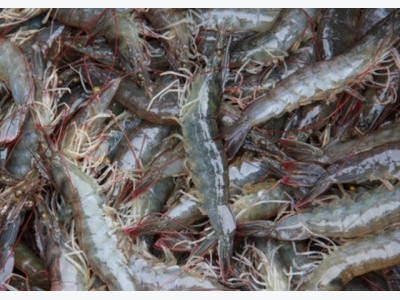Shrimp thrive on fishmeal replacement

Whiteleg shrimp fed a diet including a new microbial protein have been shown to outperform those given standard fishmeal-based feeds.
So claims Calysta, Inc., which today announced that shrimp fed a diet including FeedKind protein had equivalent or higher survival and growth. The protein is a family of natural, sustainable and traceable feed ingredients for livestock, fish and pets.
The trial is Calysta’s first study in warm water aquaculture, and represents an entry into the six million metric ton global shrimp feed market. The trial was performed at Auburn University, in conjunction with Texas A&M University.
In the trial, post-larvae Pacific whiteleg shrimp (Litopenaeus vannamei) were fed a commercially representative control diet containing fishmeal as a primary source of protein. Test diets were prepared where FeedKind protein replaced up to 100% of the fishmeal in the diet on a one-for-one basis. The animals were fed either the control or a test diet for eight weeks in a controlled environment. At the end of the study, shrimp survival was significantly improved in all FeedKind diets (93-97%) compared to the control diet (84%). In addition, the total shrimp weight in all FeedKind diet groups was shown to be equivalent to or improved versus the control fishmeal diet.
“This is a significant expansion of the global market opportunity for FeedKind,” said Josh Silverman, PhD, Calysta Founder and Chief Product and Innovation Officer. “FeedKind is being developed to meet the world’s growing demand for food and feed, and this trial demonstrates FeedKind’s potential to improve the diets in some of the world’s most challenging aquaculture species. These results show that FeedKind protein can significantly improve current aquaculture feeds, producing comparable or better results while reducing the overall environmental footprint and improving traceability and quality control in the supply chain.”
“Shrimp remain one of the most valuable seafood commodities within aquaculture, with global trade of more than $20 billion per year,” said Ronnie Tan, a member of the Calysta Advisory Board and Vice President of Blue Archipelago, the largest shrimp enterprise in Malaysia. “Innovative products such as FeedKind will be important new market entries as demand grows in emerging countries for new sources of protein.”
FeedKind is a safe, sustainable, non-animal source of protein approved for sale in multiple countries, and has been shown to use 77-98% less water and >98% less land than alternative ingredients such as soy or wheat proteins. Samples are currently available for global customers and partners in markets including the European Union, the United States, China, Japan, Southeast Asia, and Australia.
Có thể bạn quan tâm
 Redclaw crayfish (Cherax quadricarinatus)
Redclaw crayfish (Cherax quadricarinatus) Redclaw (Cherax quadricarinatus) is a freshwater crayfish native to parts of northern Australia and Papua New Guinea
 How to Farm Red Claw Crayfish
How to Farm Red Claw Crayfish This guide from the FAO Cultured Aquatic Species Information Programme provides information on farming Red claw crayfish.
 How can we save the global shrimp industry from devastating diseases?
How can we save the global shrimp industry from devastating diseases? Stable, biosecure, zero water-exchange aquaculture is the only remedy for repeated catastrophic loss from disease in the shrimp industry